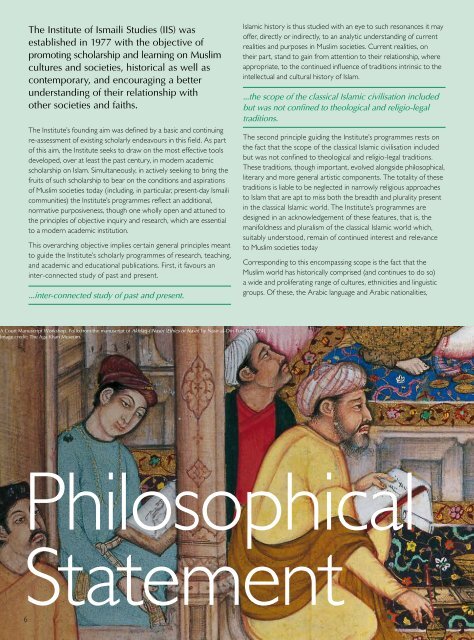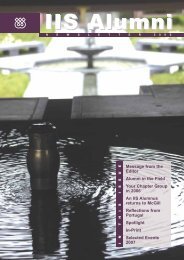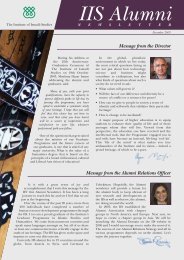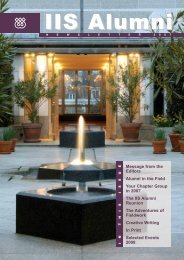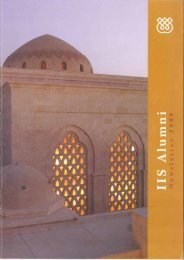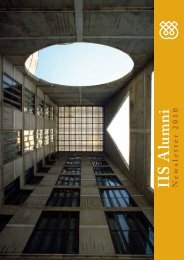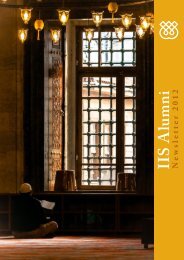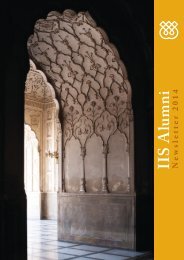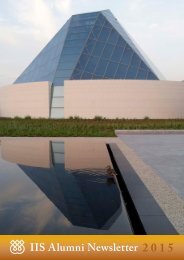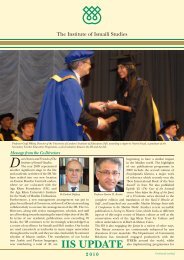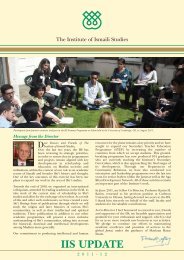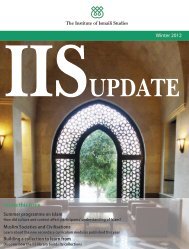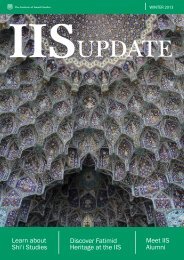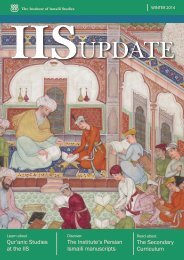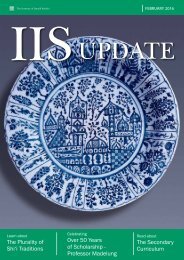IIS Brochure 2017
You also want an ePaper? Increase the reach of your titles
YUMPU automatically turns print PDFs into web optimized ePapers that Google loves.
The Institute of Ismaili Studies (<strong>IIS</strong>) was<br />
established in 1977 with the objective of<br />
promoting scholarship and learning on Muslim<br />
cultures and societies, historical as well as<br />
contemporary, and encouraging a better<br />
understanding of their relationship with<br />
other societies and faiths.<br />
The Institute’s founding aim was defined by a basic and continuing<br />
re-assessment of existing scholarly endeavours in this field. As part<br />
of this aim, the Institute seeks to draw on the most effective tools<br />
developed, over at least the past century, in modern academic<br />
scholarship on Islam. Simultaneously, in actively seeking to bring the<br />
fruits of such scholarship to bear on the conditions and aspirations<br />
of Muslim societies today (including, in particular, present-day Ismaili<br />
communities) the Institute’s programmes reflect an additional,<br />
normative purposiveness, though one wholly open and attuned to<br />
the principles of objective inquiry and research, which are essential<br />
to a modern academic institution.<br />
This overarching objective implies certain general principles meant<br />
to guide the Institute’s scholarly programmes of research, teaching,<br />
and academic and educational publications. First, it favours an<br />
inter-connected study of past and present.<br />
...inter-connected study of past and present.<br />
Islamic history is thus studied with an eye to such resonances it may<br />
offer, directly or indirectly, to an analytic understanding of current<br />
realities and purposes in Muslim societies. Current realities, on<br />
their part, stand to gain from attention to their relationship, where<br />
appropriate, to the continued influence of traditions intrinsic to the<br />
intellectual and cultural history of Islam.<br />
...the scope of the classical Islamic civilisation included<br />
but was not confined to theological and religio-legal<br />
traditions.<br />
The second principle guiding the Institute’s programmes rests on<br />
the fact that the scope of the classical Islamic civilisation included<br />
but was not confined to theological and religio-legal traditions.<br />
These traditions, though important, evolved alongside philosophical,<br />
literary and more general artistic components. The totality of these<br />
traditions is liable to be neglected in narrowly religious approaches<br />
to Islam that are apt to miss both the breadth and plurality present<br />
in the classical Islamic world. The Institute’s programmes are<br />
designed in an acknowledgement of these features, that is, the<br />
manifoldness and pluralism of the classical Islamic world which,<br />
suitably understood, remain of continued interest and relevance<br />
to Muslim societies today<br />
Corresponding to this encompassing scope is the fact that the<br />
Muslim world has historically comprised (and continues to do so)<br />
a wide and proliferating range of cultures, ethnicities and linguistic<br />
groups. Of these, the Arabic language and Arabic nationalities,<br />
though of special significance due to the decisive role in Muslim<br />
history of the Qur’anic revelation, are otherwise only a part of the<br />
ancient as well as modern Islamic world. Accordingly, the Institute’s<br />
programmes, while devoting due attention to research in Qur’anic<br />
studies and instruction in the Arabic language, include the study<br />
of such areas beyond the Arabic-speaking world as it may be<br />
equipped, at any given time to undertake, and in so far as it is<br />
of interest to its constituencies.<br />
The totality of these traditions is liable to be neglected<br />
in narrowly religious approaches to Islam that are apt to<br />
miss both the breadth and plurality present in the classical<br />
Islamic world.<br />
The above principles are obviously general. However, the practical<br />
capacities of an academic institution are inevitably limited in<br />
scope. The <strong>IIS</strong>’ programmes are largely defined by the needs and<br />
purposes, so far as they draw on scholarship in Islam and related<br />
fields, of the Ismaili communities domiciled in various parts of<br />
the world today. For this reason a good part of the research<br />
and publication activities of the Institute, and in particular of<br />
its educational publications and programmes, are at present<br />
focused on the Ismaili jamats (communities); and, secondarily,<br />
on the complex of Shi‘i traditions within Islam, of which the<br />
Ismaili traditions are a part. This special focus of the Institute’s<br />
programmes does not negate, however, the importance of the<br />
overarching principles stated above.<br />
A portion of the Institute’s publications, research<br />
activities and graduate courses are devoted, to the<br />
extent that is viable, to studies in the more general<br />
fields of Islam and comparative religion, as well as<br />
such aspects of the humanities as have a relevance<br />
to the study of these fields.<br />
A portion of the Institute’s publications, research activities and<br />
graduate courses are devoted, to the extent that is viable, to<br />
studies in the more general fields of Islam and comparative<br />
religion, as well as such aspects of the humanities as have a<br />
relevance to the study of these fields. Moreover, all four of the<br />
areas hereby entailed – Ismaili, Shi‘i, generally Islamic and (where<br />
feasible) comparative religion and culture – will draw on such<br />
disciplinary approaches, e.g. history, linguistics, philosophy, literary<br />
criticism and social sciences, as are likely to contribute to the<br />
perspectives outlined above.<br />
In particular, it is expected that the field of ethics, which straddles<br />
the modern divide between religious and secular cultures as well<br />
as the humanities and social sciences presents special challenges<br />
today due to developments in modern technologies; and which by<br />
definition represents the normative aspiration, in human societies,<br />
for material and spiritual well-being, will feature importantly in the<br />
Institute’s programmes of research, teaching and publication.<br />
A Court Manuscript Workshop. Folio from the manuscript of Akhlaq-i Nasiri (Ethics of Nasir) by Nasir al-Din Tusi (d. 1274).<br />
Image credit: The Aga Khan Museum.<br />
Philosophical<br />
Statement<br />
6<br />
7


